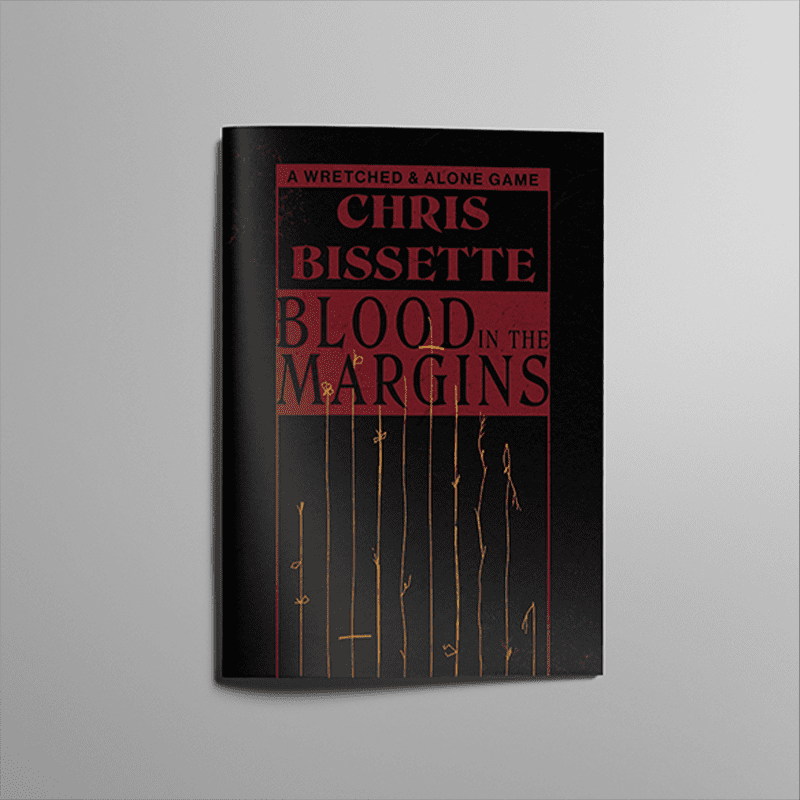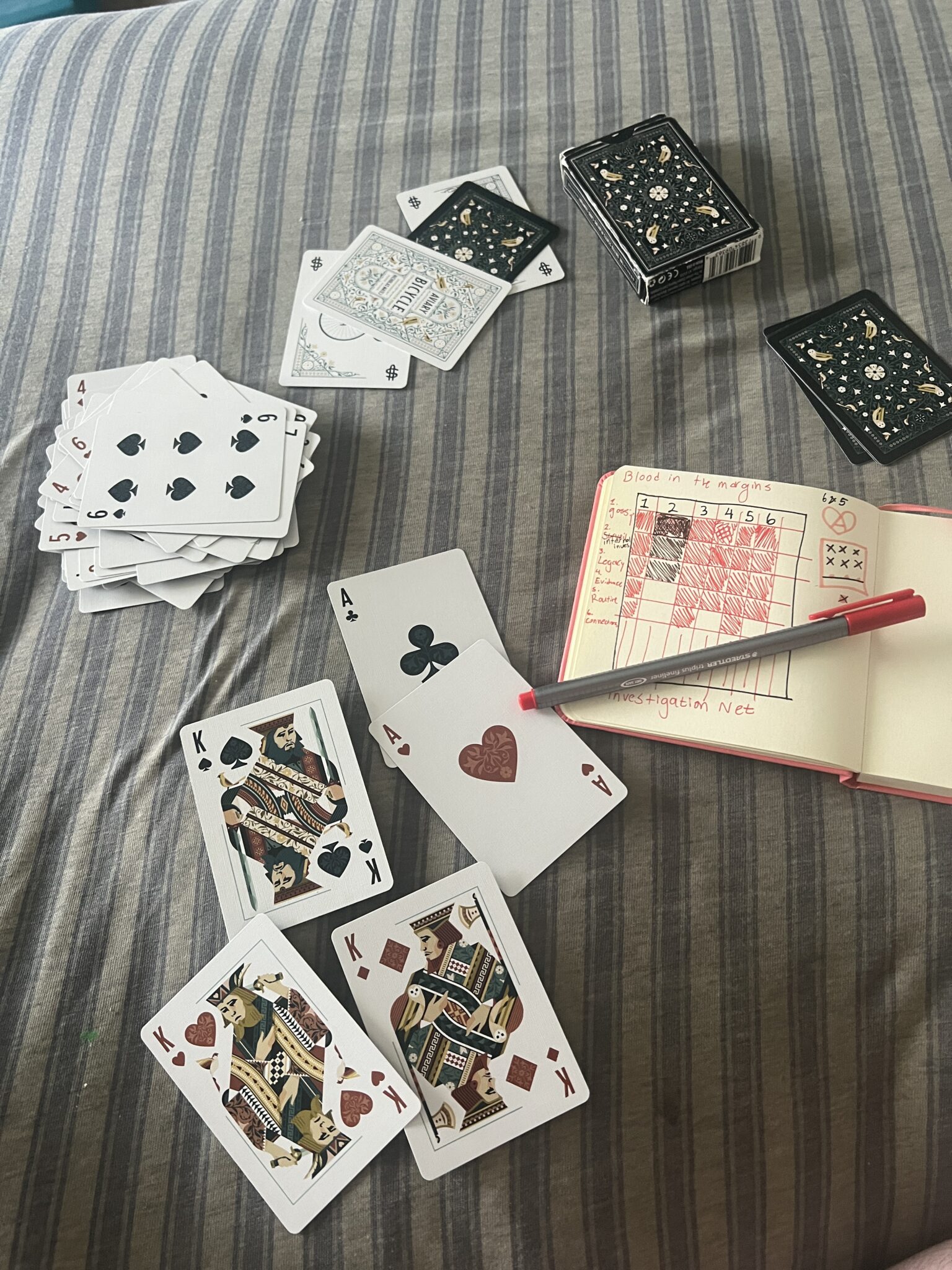Blood in the Margins by Chris Bissette is the first solo game I played this year. It’s also the first solo game I’ve played to almost give me an anxiety attack! Blood in the Margins is a solo journaling TTRPG where you play as a student at a prestigious magic academy, but make no mistake; this is no children’s book. You and your friends have conspired to and have murdered a fellow peer. They may or may not have deserved it, up to you, but The Academy is investigating the murder and you fear the vow of secrecy that keeps you and your friends safe and untouchable is beginning to unravel. The halls of the academy know what you’ve done. Halls that never wanted you here. Halls that will have you leave, even if it means your blood spills too.

Prologue: The Histories And Secrets We Keep
Blood in the Margins is an update to an older game system by Bissette, Wretched & Alone (which I’ll refer to as W&A from here on). To understand the basics of Blood in the Margins, you have to understand W&A is a game about struggling to survive with little to no chance of getting out alive of a terrible situation. W&A games are usually played with a single d6, ten tokens, a shuffled deck of playing cards (jokers removed), something to write or record play, and a tumbling block tower (optional).
Your play is split up into Days, Weeks, or Months (Days is traditional). You roll the die and draw that number of cards as the number on the d6. As you play, your goal is to acquire the Ace of Hearts and hope you roll a 6 in order to remove tokens one by one from the Ace. As you continue playing in order to survive the situation your character finds themselves in, things deteriorate quickly. Ace cards will sometimes grant boons (such as a roll of 6 OR 5 now removes a token), while other cards you draw will prompt you to pull from the tower. If the tower falls, your character has died and the story ends. The other way to die is to pull four Kings; once all four King cards are pulled from the deck, your character dies by the prompt on the last King pulled. Meanwhile, you are journaling your descent into the worst, most panic inducing scenarios you can imagine.
The chance of success in playing these games and getting the “good ending” is less than 1%. It’s bleak, yet I adore these games. Bissette has broken tradition here, and their additions and changes are incredible. We’ll get to this later.
My character also broke tradition in my playthrough. His secret and transgression can cost him his life.
Act 1: Murderous Machinations.
Act 1 of the game begins with the Autumn semester and your return to The Academy after a summer away from the blood you spilled onto the floors. The requirements before you return to classes is to draw a 6×5 grid (or go for 6×6 for higher survival) called the Investigation Net. You then choose six aspects of the Academy’s murder investigation and assign these to the columns. When a card prompts, you roll a d6 and fill in a single square according to the labels you gave to the Investigation Net. Then, you start by pulling three cards a day and journaling the events of the day. This seems easy enough to do without much anxiety and if you manage to avoid pulling Kings.
But the cards that prompt the fills on the Investigation Net can be what get you early. I had card pulls and dice roll combos that caused one aspect of the Net to be almost filled in Act 1. There is a dance to the anxiety of pulling the card, rolling the die, and hoping it doesn’t land on a column that is almost filled. That being said, I was also incredibly lucky because I didn’t pull many cards that required a roll for the Investigation Net in Act 1. I also pulled the Queen of Diamonds during this Act which changed the Investigation Net to be less of a risk later down the line. It informed me that the Academy had opened an internal investigation into the death of my classmate and asked me to make these changes:
“Select one column on the Investigation Matrix and re-label it “Internal Investigation”. You may erase any marks you have already made in this column, but if you do so you must distribute an even number of marks across the other columns.”
Relief. Short lived, but relief nonetheless. I eventually pull the Ace of Spades and move into Act 2: Winter Break.
Intermission: An Aside On Power, Classism, and Bloodshed.
A key aspect of Blood In The Margins is its use of the British private school system and the way in which British classism functions. There’s a silence to a lot of the richest families in the world. Quiet wealth and well kept secrets is how the wealthy remain powerful, and how their children inherit it. Folks in the upper echelon don’t like outsiders in their midst at the best of times.
In my own personal, non-English experience: my step-father, notably American and of Irish descent, was forcibly sent to a private Catholic school in his hometown. His tuition to the school was paid for by his parents. He hated every second of that school. He was an outsider not for anything physical, but for his class and the company he kept as his friends. It was the 1970’s and, post Brown vs Board of Education, public school segregation was deemed illegal.
American private schools, especially religious ones, became popular after integration in order to keep black students out of formerly majority white school districts. This was also done to keep white families’ white children away from people they saw as beneath them, to keep them away from access to knowledge, to a better education, and to a level playing field. To maintain power, one must maintain the illusion that you are inherently better than other people.
My father is white and didn’t believe in segregation. He was a hippie teenager in the 1970’s and wanted to go to an integrated public school, the one where his friends that were racially bullied out of his private high school went to. His father refused.
I thought about my father every second of playing this game. It went into how I played my character and how I built the world. Magic can be learned by everyone, but it just so happens that the upper classes of the world I’ve built hoards magic as much as their wealth. They tell the lower class that they have no innate power in their hands and that they are lesser because they “can’t” learn the arcane. My young mage had decided to prove the Academy and the world wrong long ago. They lied on their application forms and somehow got into the Academy undetected. However, in a chase for power and proof that “yes, I am like you”, you meet someone from your life before. Someone that knows your secret. You can’t tell me that the proximity to power doesn’t breed paranoia that you’ll lose everything. That your house of cards will fall if this person so much as misspeaks.
Silence and bloodshed is the only option when you’ve lost touch of why you were doing this in the first place. Or, was this what you always wanted in your rot blackened heart, young mage?
Act 2: Winter Break. Paranoia Closes In.
Blood in the Margins Act 2 continues into Winter Break. The rules here change ever so slightly. Instead of drawing three cards, you draw only two. The quiet of the Winter days when many students either return home for the holiday season or stay at school dorms if they have no home to return to. You remain at the dorms. This is the slowest burn of the Acts but many days can pass and both cards have the potential to ask you to fill in the Investigation Net. The days passed with constant anxiety with the walls of the murder investigation and the weight of bloodshed hanging over me like a Sword of Damocles.
I eventually managed to pull the Ace of Hearts, the card required to create a potential “Good Ending” condition for the game. The mechanical text for the Ace of Hearts is as follows: “At the end of each day, after completing your journal entry, you may roll a six-sided die. On a result of 6, remove one token from this card. If you successfully remove all tokens from the card, the story you’ve told becomes the only one that matters. You are never going to be caught. You win the game. At any time when you make an Investigation roll, you may choose to add one token to this card to increase or decrease the result of your roll by 1, to a minimum of 1 or a maximum of 6. You can’t use this ability if there are already 10 tokens on the card.” The very next pull included the Ace of Clubs which mechanically makes it so a 5 or 6 on the die is able to remove a token and advances the game to the final act.
Thus begins Act 3…
Act 3: The Taste Of Iron And Ichor.
Act 3 follows us to the spring semester and how close The Academy’s investigation is to solving the murder. The rules change again, but only slightly, in this Act. You draw only two cards for each day, but after each card prompt you must roll a d6 and fill in it’s corresponding numbers association on the investigation net. You just have to hope nothing fills up by this time in the semester. Just a few more weeks, and you’ll be free. Right?
I managed to somehow roll a good string of five’s and six’s on the Ace of Hearts/Clubs aided die. The entirety of Act 3 my heart was running in my chest. “Will I make it out of here?” I had already pulled three Kings with only three cards and one token left on the Ace of Hearts.
Somehow, all the blood was worth it. I rolled a five and cleared the last token. I breathed a sigh of relief and picked up the last three cards. The very next draw if not for that final roll had the King of Spades. Death. The Investigation Net was filled almost 6×6 in three rows. I was incredibly lucky.
Or was I?

Epilogue
The saying goes “the blood of the covenant is thicker than the water of the womb”. A pact made with heart, belief, and dedication to a common goal is often stronger than ties with those that bore, raised, and loved you.
Sometimes, like in this game, the blood you spilled together is what ties you not only to those around you, but to The Academy. Our Epilogue asks us directly if we survived. If yes, Bissette explains that “…even victory has its price.
Even if the world believes your lies, you will always carry the truth inside you. Bloodstains always reach the most unexpected places.”
Your lies, every one you said, constructed, and fed so carefully to everyone; they believe you. Only you and those that stood beside you during the murder know the truth and you will always have the anxiety of “will they say something?” Your life will be painted with ichor. You’ve achieved the impossible, you’ve earned your right to the upper echelon of society. If you can keep your lies straight forever.
The death you caused will color everything you do forever now.
In the end, was the blood worth the ichor?
Who’s to say?
Blood in the Margins can be purchased over on Loot The Room’s itch.io page and soon to be available on their physical zine store.
Images via Loot the Room
Have strong thoughts about this piece you need to share? Or maybe there’s something else on your mind
you’re wanting to talk about with fellow Fandomentals? Head on over to our Community server to join in
the conversation!


